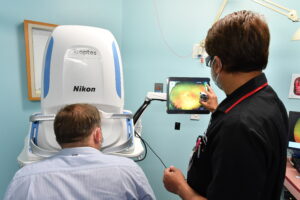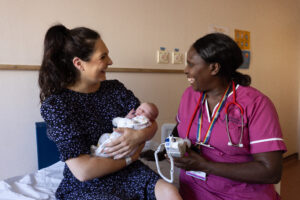The purchase of advanced medical equipment improves diagnosis and treatment, helping to ensure patients receive excellent care and the best possible outcomes.
Head and neck cancers account for approximately 4% of all cancers and despite advances in technology and approach, five-year survival rates are poor in the UK, due to delays in diagnosis and treatment.
The multi-disciplinary head and neck cancer team at Kingston Hospital work with regional partners to diagnose patients as early as possible and expedite cancer treatment at specialist cancer centres.
A substantial increase in demand, caused by a combination of service reorganisation in South West London and an ageing population, has highlighted the urgent need for additional specialist diagnostic equipment.
Funding is now being sought for two head and neck ultrasound machines, a surgical ear nose and throat (ENT) navigation system, an intraoperative nerve monitor and a stroboscopy system. Their acquisition will help reduce the length of time for diagnosis, while ensuring Kingston Hospital achieves the 28 day faster diagnosis standard and national 31 day waiting time for treatment target for its head and neck patients, increasing the number of patients living for five years or more following a cancer diagnosis
These equipment items will also improve health outcomes in terms of swallowing, speech and breathing for those patients undergoing surgical biopsy or when recovering from radiotherapy for laryngeal cancer, while helping deliver more efficient services.

The management of chronic diseases, such as glaucoma and age-related macular degeneration, requires regular follow-up for the duration of a patient’s life. In an ageing population this is putting unprecedented demand on existing clinical services at Kingston Hospital, which is why the ophthalmology team is developing virtual diagnostic clinics. This provides a significantly more efficient way of monitoring low and medium risk patients as clinicians can review patient scans virtually, reducing the need for face-to-face assessment.
In order to realise the benefits of this new way of delivering care more efficiently, while responding to the growing demand, the Royal Eye Unit is seeking to purchase a multimodal imaging platform and a second ultra-widefield retinal imaging system.

The maternity service is seeking to purchase a LifeStart Trolley, which is a mobile unit that provides bedside neonatal care, for babies that need resuscitation on the labour ward. Currently newborns who need help with breathing straight after birth are taken away from their mothers to a resuscitation unit. The LifeStart trolley allows the newborn to be looked after at the bedside. The trolley is small, mobile and adjustable. The resuscitation surface enables the baby’s airway to be supported on a warm platform whilst leaving the umbilical cord intact.
The group of muscles that form the anal sphincter can be torn or damaged during childbirth in up to 6% of women having a vaginal delivery, which can lead to long term consequences. Anorectal manometry has been shown to identify more women with sphincter function impairment than is currently possible with the endoanal ultrasound that is used at Kingston Hospital’s pelvic floor clinic. Acquiring a manometry machine will help identify those women that are affected, ensuring they receive appropriate counselling with regards to their management of postnatal faecal incontinence and delivery in subsequent pregnancies.
To make a donation to support any of these projects, please click here